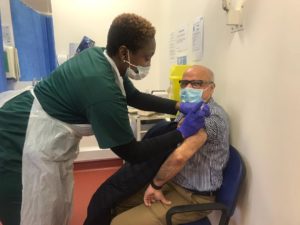
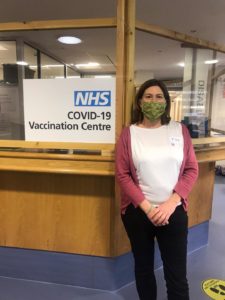
‘The vaccine will save our lives and allow us to go back to normal’ Rosie Dada, Practice Nurse
We are excited to offer you the Covid Vaccine to protect you from suffering with the Coronavirus.
100’s of our patients, 1000’s of people in Lewisham, and over a million people in South East London have had the vaccine already – here are some of the questions we’ve been asked and what our team of reception, doctors and nurses have been saying. But first a message from some of our patients and staff:
What is it like having a Covid Vaccine?
All the doctors at the Grove have had our Covid Vaccine. The vaccination is given with a small injection into the muscle at the top of the arm by the shoulder. It feels similar to getting a flu vaccine or the vaccines we give your children. Some of us don’t like needles but we all managed!
Here is what some healthcare staff in South East London had to say about getting the vaccine:
Would you like to hear about the vaccine in Arabic, Chinese, Nepali, Yoruba, Polish, Romanian, Pidgin, Pashto, Farsi, Urdu, Cantonese, Tamil
Does the Covid Vaccine have side effects?
Some of us had a sore arm where the injection went in for a day or two – we know this is really common with the vaccine although not everyone gets it. We could all use our arms normally even when they were sore.
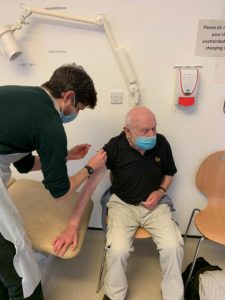
Some of us felt tired and had sore muscles for a day or two. Some people get headaches and nausea. It feels similar to when you have a cold but without the runny nose. You can use paracetemol to help you feel better. The feeling goes away by itself. None of us had to miss any time off work because of the vaccine.
Another side effect is we all feel more relaxed now knowing we are protected when we come to work!
Oxford AstraZeneca vaccine side effects update April 2021:
Recently there have been reports of a very rare condition involving blood clots and unusual bleeding after vaccination. This is being carefully reviewed but the risk factors for this condition are not yet clear.
Although this condition remains extremely rare there appears to be a higher risk in people shortly after the first dose of the AstraZeneca vaccine. Around 4 people develop this condition for every million doses of AstraZeneca vaccine doses given.
This is seen slightly more often in younger people and tends to occur between 4 days and 2 weeks following vaccination. This condition can also occur naturally, and clotting problems are a common complication of COVID-19 infection. An increased risk has not yet been seen after other COVID-19 vaccines but is being carefully monitored.
The COVID-19 vaccine can help stop you getting seriously ill or dying from coronavirus. For people aged 30 or over and those with other health conditions, the benefits of being vaccinated outweigh any risks.
For people under 30 without other health conditions: it’s currently advised that it’s preferable to have another COVID-19 vaccine instead of the AstraZeneca vaccine. If you choose to have another COVID-19 vaccine you may have to wait to be protected. You may wish to go ahead with the AstraZeneca vaccination after you have considered all the risks and benefits for you. If you are not under 30, you are currently not able to choose which vaccine you will receive.
How much protection does the Covid Vaccine give you?
The Covid vaccine is highly effective at protecting you from getting sick from the Coronavirus. Not many things in life are perfect and the Covid vaccine doesn’t give you 100% protection but it is a very good vaccine. We have seen so many people suffer with coronavirus this year – struggling to breathe, going to hospital and dying – the vaccine protects you from this. We’ve been really lucky to get a vaccine that works so well so quickly, thanks to the hard work of scientists across the globe.
You get a good level of protection from the first vaccine. To make sure that protection lasts you need to have the second injection too which will be around 12 weeks after the first dose.
Having the vaccine is good protection but you’ll be even better protected when everyone around you is vaccinated as well so encourage your friends and family to get the vaccine too when its their turn.
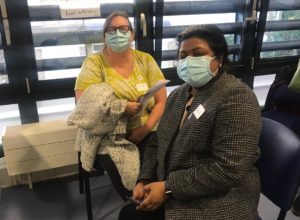
How did they make the vaccine so quickly?
Scientists around the world have predicted that a pandemic like the Covid-19 virus might be coming for years and have been trying to get ready. By the time Covid-19 came they had a plan about how to design, test and make enough vaccine – quickly. The coronavirus has impacted so many people’s lives across the globe, our health, the lockdowns, the economy. This has meant that finding a Covid Vaccine has been top priority for everyone. All the money, time, effort and good will that you need to get things done quickly has been there. We’ve been lucky too – our body’s immune system does fight coronavirus so we just need to find a way to give our bodies a headstart. Problems like curing cancer are much more difficult.
If you want to know how they made the vaccine so fast have a look at this video made by the Oxford team. Humans can do amazing things when they work together.
How safe is the Covid Vaccine?
“I have confidence in our Scientists.” Rosie Dada Practice Nurse
The Covid Vaccines have been given to thousands of people across the globe as part of huge clinical trials. They have been given to men and women, the old, the young, people of different racial groups, healthy people and those with medical problems. It has now been given to millions of people in the UK. The researchers and doctors looking after all these patients have been carefully looking for any long term problems coming from the vaccine. Fortunately very few problems have been identified. We will continue to carefully look for long-term problems from the vaccine. Every day, we are seeing people suffering the long-term problems from long Covid. We encourage you to take the vaccine to protect yourself from what can be a devastating infection.

I’ve heard a lot of scary things about the vaccine – are they true?
2020 was a scary year. We learnt to be scared of all sorts of things from running out of toilet paper to hugging our friends and family. A lot of people have been telling us that they have been hearing a lot of scary things about the vaccine especially on social media. We’ve heard of all kinds of things which are not true – that 1000’s of people have died from the vaccine, the vaccine will change your DNA, there is a microchip in the vaccine, that the vaccine will affect your fertility. If you want to read more about this claims have a look here. If you’ve been scared by these stories please get in touch with us and we can talk it through.
Can I have vaccine if I have allergies?
The first vaccine to be approved was the Pfizer vaccine – at the beginning there were some worries about giving the vaccines to people with any kind of allergy and understandably we’ve had a lot of questions around this. After looking into this further the experts have agreed that almost everyone is safe to have any of the vaccines. It is very rare to get an allergic reaction, and everyone who has had a reaction has been treated and fully recovered.
If you have had a severe allergic reaction in the past to a vaccine or an unknown substance, please discuss with us. The most common questions were are asked are about penicillin allergies and egg allergies: neither of these allergies means that you cannot have the vaccine If you have an allergic reaction to your first Covid vaccine please speak to us before you have the next one.
Everywhere the vaccines are being given will have the equipment to treat allergic reactions including severe reactions like anaphylaxis and vaccinators trained to give that treatment.
If you’d like to have a look at the detailed guidance about the vaccines and allergies please look here for the Oxford AstraZeneca vaccine and here for the Pfizer vaccine.
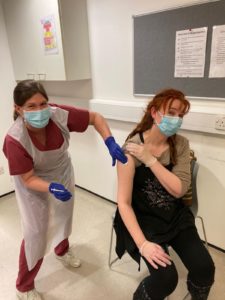
I’m pregnant or want to have a baby – is it safe to take the vaccine?
We are always extra careful about giving new medications to women when they are pregnant, and so initially whilst waiting for more data the vaccine was not recommended for pregnant women except those at very high risk. However, recently the guidance has changed that all pregnant women should be offered the vaccine as the benefits of being protected from Covid outweigh any risks – research so far has not shown any risks with taking the vaccine when you are pregnant. Pregnant women will be offered a vaccine that is not the Oxford AstraZeneca vaccine due to the increased risk of blood clots.
If you have the vaccine you don’t need to wait before getting pregnant. Women who are breastfeeding can have the vaccine. There is no evidence and no reason to believe the Covid Vaccine can affect fertility.
If you want to know more about any of these issue please check this leaflet here or look on the Royal College of Obstetricians and Gynaecologist’s website here for lot of information about coronovirus and women’s health.
Do you have more questions about the vaccine?
If you haven’t found what you need to know please have a look here for the NHS’s vaccine information or here for the South East London Covid Vaccine information.
If you have questions about the vaccine speak to one of us or send us and email – we’d love to talk to you.
Covid Vax Facts-Created to answer the public’s questions about the COVID-19 vaccines.
The ‘COVID VACCINE, YOUR QUESTIONS ANSWERED’ webinar is now available – click here to watch
Please note that since the recording of this webinar, national guidance on Covid-19 vaccination for pregnant women and the use of Astra Zeneca vaccine in under 30’s has been updated. Please see here: selondonccg.nhs.uk/covid19vaccine



